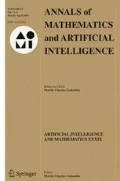Abstract
Many data sources can be represented easily by collections of sets of objects. For several practical queries on such collections of sets of objects, the answer does not depend on the precise composition of these sets, but only on the number of sets to which each object belongs. This is the case k= 1 for the more general situation where the query answer only depends on the number of sets to which each collection of at most k objects belongs. We call such queries k-counting-only. Here, we focus on k-SyCALC, i.e., k-counting-only queries that are first-order definable. As k-SyCALC is semantically defined, however, it is not surprising that it is already undecidable whether a first-order query is in 1-SyCALC. Therefore, we introduce SimpleCALC-k, a syntactically defined (strict) fragment of k-SyCALC. It turns out that many practical queries in k-SyCALC can already be expressed in SimpleCALC− k. We also define the query language GCount− k, which expresses counting-only queries directly by using generalized counting terms, and show that this language is equivalent to SimpleCALC-k. We prove that the k-counting-only queries form a non-collapsing hierarchy: for every k, there exist (k+ 1)-counting-only queries that are not k-counting-only. This result specializes to both SimpleCALC− k and k-SyCALC. Finally, we establish a strong dichotomy between 1-SyCALC and SimpleCALC− k on the one hand and 2-SyCALC on the other hand by showing that satisfiability, validity, query containment, and query equivalence are decidable for the former two languages, but not for the latter one.
Similar content being viewed by others
References
Abiteboul, S., Hull, R., Vianu, V. (eds.): Foundations of Databases: The Logical Level, 1st edn. Addison-Wesley Longman Publishing Co. Inc, Reading (1995)
Anderson, I.: Combinatorics of Finite Sets. Dover Publications, New York (2011)
Bachmair, L., Ganzinger, H., Waldmann, U.: Set constraints are the monadic class. In: Proceedings Eighth Annual IEEE Symposium on Logic in Computer Science, pp. 75–83 (1993)
Badia, A., Van Gucht, D., Gyssens, M.: Querying with Generalized Quantifiers, pp 235–258. Springer, Boston (1995)
Bancilhon, F.: On the completeness of query languages for relational data bases. In: Winkowski, J. (ed.) Mathematical Foundations of Computer Science 1978, Proceedings, 7th Symposium, Zakopane, Poland, September 4-8, 1978, Lecture Notes in Computer Science. https://doi.org/10.1007/3-540-08921-7_60, vol. 64, pp 112–123. Springer (1978)
Bayer, A.E., Smart, J.C., McLaughlin, G.W.: Mapping intellectual structure of a scientific subfield through author cocitations. J. Amer. Soc. Inf. Sci. 41(6), 444–452 (1990)
Calders, T., Goethals, B.: Non-derivable itemset mining. Data Min. Knowl. Disc. 14(1), 171–206 (2007)
Fletcher, G.H.L., Van Den Bussche, J., Van Gucht, D., Vansummeren, S.: Towards a theory of search queries. ACM Trans. Database Syst. 35(4), 28:1–28:33 (2010)
Goethals, B.: Survey on Frequent Pattern Mining. Technical report, University of Helsinki (2003)
Grädel, E., Otto, M.: On logics with two variables. Theor. Comput. Sci. 224 (1–2), 73–113 (1999)
Grohe, M.: Finite variable logics in descriptive complexity theory. Bull. Symb. Log. 4, 345–398 (1998)
Gyssens, M., Hellings, J., Paredaens, J., Van Gucht, D., Wijsen, J., Wu, Y.: Calculi for symmetric queries. J. Comput. Syst. Sci. 105, 54–86 (2019)
Gyssens, M., Paredaens, J., Van Gucht, D., Wijsen, J., Wu, Y.: An approach towards the study of symmetric queries. Proc. VLDB Endow. 7(1), 25–36 (2013)
Han, J., Pei, J., Yin, Y., Mao, R.: Mining frequent patterns without candidate generation: a frequent-pattern tree approach. Data Min. Knowl. Disc. 8(1), 53–87 (2004)
Hellings, J., Gyssens, M., Van Gucht, D., Wu, Y.: First-order definable counting-only queries. In: Foundations of Information and Knowledge Systems, pp. 225–243. Springer International Publishing (2018)
Kuske, D., Schweikardt, N.: First-order logic with counting. In: 2017 32nd Annual ACM/IEEE Symposium on Logic in Computer Science (LICS), pp. 1–12 (2017)
Lewis, H.R.: Complexity results for classes of quantificational formulas. J. Comput. Syst. Sci. 21(3), 317–353 (1980)
Libkin, L.: Elements of Finite Model Theory. Springer, Berlin (2004)
Paredaens, J.: On the expressive power of the relational algebra. Inf. Process. Lett. 7(2), 107–111 (1978). https://doi.org/10.1016/0020-0190(78)90055-8
Paredaens, J., Van Gucht, D.: Converting nested algebra expressions into flat algebra expressions. ACM Trans. Database Syst. 17(1), 65–93 (1992). https://doi.org/10.1145/128765.128768
Peters, S., Westerståhl, D.: Quantifiers in Language and Logic. Oxford University Press, London (2008). https://doi.org/10.1093/acprof:oso/9780199291267.001.0001
Quine, W.V.: Selected Logic Papers. Harvard University Press, Cambridge (1995)
Sayrafi, B., Van Gucht, D.: Differential constraints. In: Proceedings of the Twenty-fourth ACM SIGMOD-SIGACT-SIGART Symposium on Principles of Database Systems, pp. 348–357. ACM (2005)
Sayrafi, B., Van Gucht, D., Gyssens, M.: Measures in Databases and Data Mining. Tech. Rep. TR602, Indiana University. https://www.cs.indiana.edu/cgi-bin/techreports/TRNNN.cgi?trnum=TR602 (2004)
Thomas, S.J., Fischer, P.C.: Nested relational structures. Adv. Comput. Res. 3, 269–307 (1986)
Väänänen, J.: Generalized Quantifiers, an Introduction. In: Generalized Quantifiers and Computation: 9th European Summer School in Logic, Language, and Information, pp. 1–17. Springer, Berlin (1999)
Vianu, V., Van Gucht, D.: Computationally complete relational query languages. In: Liu, L., Özsu, M.T. (eds.) Encyclopedia of Database Systems. 1st edn., pp 1–7. Springer, New York (2017)
Westerståhl, D.: Generalized quantifiers. In: Zalta, E. N. (ed.) The Stanford Encyclopedia of Philosophy, winter 2016 edn. Metaphysics Research Lab, Stanford University (2016)
Acknowledgments
This is a revised and extended version of the conference paper ‘First-order definable counting-only queries’, presented at the 10th International Symposium on Foundations of Information and Knowledge Systems, Budapest, Hungary (FoIKS 2018) [15].
Author information
Authors and Affiliations
Corresponding author
Additional information
Publisher’s note
Springer Nature remains neutral with regard to jurisdictional claims in published maps and institutional affiliations.
This material is based on work supported by the National Science Foundation under Grant No. NSF 1438990.
Rights and permissions
About this article
Cite this article
Hellings, J., Gyssens, M., Van Gucht, D. et al. First-order definable counting-only queries. Ann Math Artif Intell 87, 109–136 (2019). https://doi.org/10.1007/s10472-019-09652-8
Published:
Issue Date:
DOI: https://doi.org/10.1007/s10472-019-09652-8



